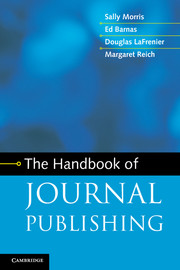Book contents
- Frontmatter
- Contents
- Preface and acknowledgments
- 1 Introduction to journals
- 2 Managing journals
- 3 Editing
- 4 The production process
- 5 Journal metrics
- 6 Marketing and sales
- 7 Fulfillment
- 8 Journal finances
- 9 Subsidiary income
- 10 Contract publishing
- 11 Copyright and other legal aspects
- 12 Ethical issues
- 13 The future of scholarly communication
- Appendix 1 Glossary
- Appendix 2 Resources
- Appendix 3 Vendors
- Index
- References
5 - Journal metrics
Published online by Cambridge University Press: 05 March 2013
- Frontmatter
- Contents
- Preface and acknowledgments
- 1 Introduction to journals
- 2 Managing journals
- 3 Editing
- 4 The production process
- 5 Journal metrics
- 6 Marketing and sales
- 7 Fulfillment
- 8 Journal finances
- 9 Subsidiary income
- 10 Contract publishing
- 11 Copyright and other legal aspects
- 12 Ethical issues
- 13 The future of scholarly communication
- Appendix 1 Glossary
- Appendix 2 Resources
- Appendix 3 Vendors
- Index
- References
Summary
Why measure journals?
The measurement and ranking of journals has been an obsession of the scholarly communication community since at least the mid-1970s when Eugene Garfield, scientist and founder (in 1955) of the Institute for Scientific Information, first published the Journal Citation Reports (JCR), which ranked journals by the journal impact factor (JIF) (Thomson Reuters, n.d.; Adler et al., 2008). A variety of journal metrics have evolved since the release of the first JCR, purporting to measure a variety of journal aspects such as quality, usefulness, popularity, and influence.
But why the interest in measuring journals? Librarians want information that can inform their decisions on which journals to purchase or renew; authors want to know which are the most prestigious places to publish; and publishers want to know about the relative standing of the journals they publish and those they may try to acquire. Additionally, funding bodies and promotion committees have controversially used journal metrics as an indicator of the quality of individual authors’ papers published in those journals. This in turn increases the pressure on authors to publish their work in the highest-ranked journals, and on publishers to get their journals ranked as highly as possible in order to attract the best authors.
- Type
- Chapter
- Information
- The Handbook of Journal Publishing , pp. 133 - 155Publisher: Cambridge University PressPrint publication year: 2013

